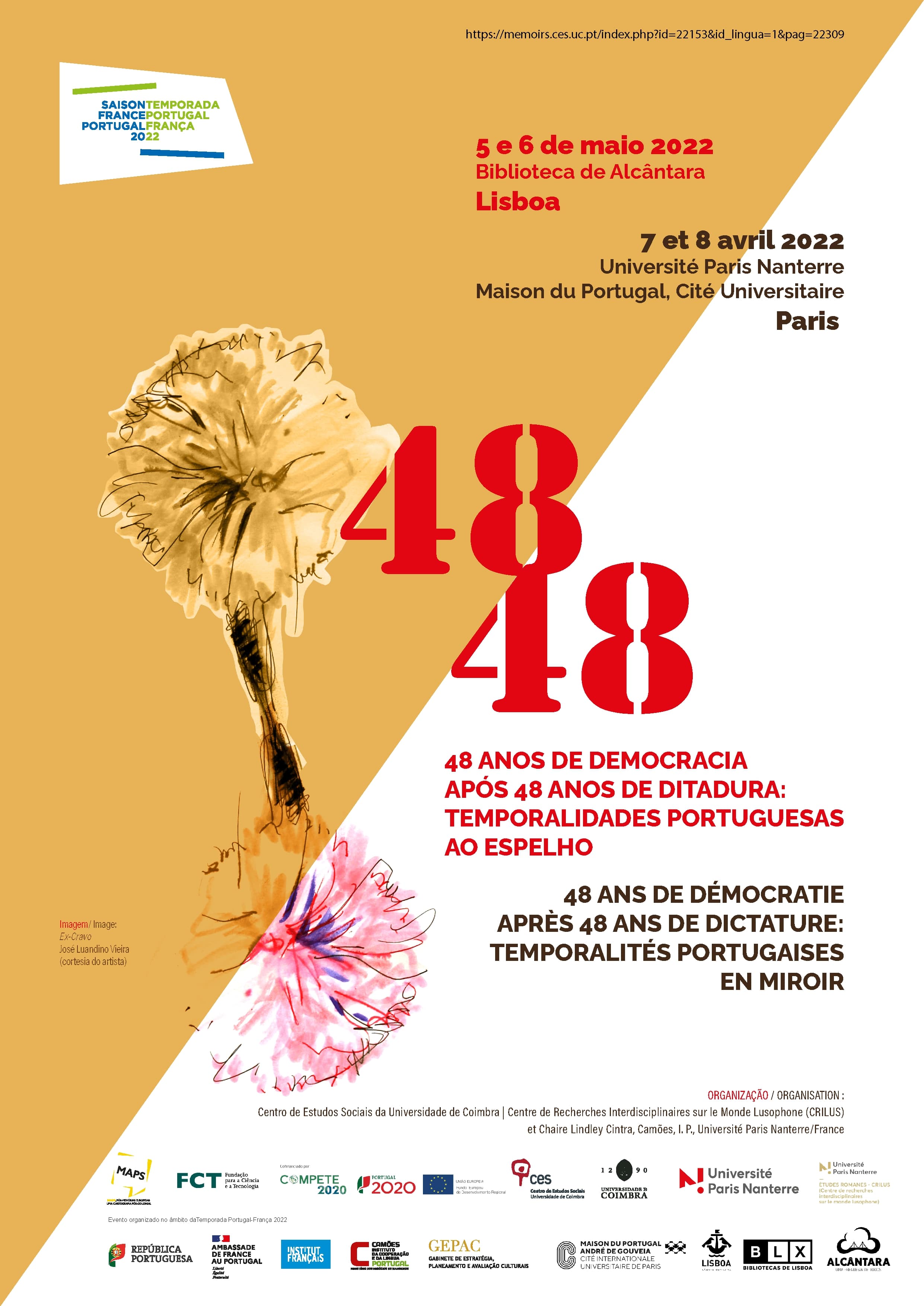Colóquio Internacional
48 X 48, um passado europeu contemporâneo | Temporalidades portuguesas ao espelho: 48 anos de democracia, 48 anos de ditadura
5 e 6 de maio de 2022, 10h00-18h00
Biblioteca de Alcântara (Lisboa)
Apresentação
“Durante 48 anos Portugal viveu sob a mais longa ditadura da Europa Ocidental do século XX”. Estas são as primeiras palavras do texto com que Susana de Sousa Dias apresenta o seu filme (2009, Prix Cinéma du Réel 2010 / Centre Georges Pompidou) que a realizadora intitula precisamente 48, para sublinhar o número de anos que, no século passado, condicionaram, as mentalidades das populações da “unidade territorial do Império Português”, segundo a mística do Estado Novo de Salazar. A realizadora portuguesa enfrenta este passado autoritário, focando a lente da sua câmara sobre fotos de presos políticos, provenientes dos dossiers da Polícia Política. A partir desses “arquivos do mal” , o filme inscreve na retina do espetador os rostos de um além inquietante, que olhamos em frente e cujas vozes ouvimos no presente. A temporalidade sobrepõe estes dois tempos heterogéneos acentuando a perceção de uma realidade silenciosa que reaparece e que é impossível ignorar. O passado impõe-se como urgência no presente.
Este presente terá um sabor especial no dia 25 de abril de 2022. Esta data que, desde 1974 marca anualmente a celebração da Revolução dos Cravos será ocasião de relembrar também o 48º aniversário da democracia portuguesa, colocando face a face dois períodos com a mesma extensão temporal, permitindo uma forma de mise en abîme: 48 anos de ditadura, 48 anos de democracia. Que balanço? A quem pertencem estas memórias? Como traçamos o futuro?
A partir de uma perspetiva interdisciplinar e transversal, o colóquio 48x48 – Temporalidades Portuguesas ao Espelho propõe-se analisar e debater as circulações e legados das memórias deste passado no presente. A questão da memória e da transmissão intergeracional da memória será analisada à luz de três eixos fundamentais: a memória e pós-memória migratória, a memória e pós-memória da ditadura, a memória e pós-memória colonial e, ou seja, que memória e que projeções nas gerações seguintes relativamente a estes tempos de onde Portugal emerge e que Portugal vive?
O colóquio internacional tem uma organização francesa e portuguesa no âmbito da Temporada Cruzada que junta os dois países ao longo deste ano: o CRILUS – Centre de Recherches Interdisciplinaires sur le monde Lusophone, da Universidade de Paris-Nanterre, com a colaboração da Casa de Portugal na cidade universitária de Paris e o Centro de Estudos Sociais da Universidade de Coimbra, através do projeto Maps – Pós-Memórias Europeias: uma cartografia pós-colonial (FCT - PTDC/LLTOUT/7036/2020) numa colaboração com a Biblioteca de Alcântara e as bibliotecas municipais da Câmara Municipal de Lisboa.
O colóquio decorre em Paris na Universidade de Paris Nanterre e na Casa de Portugal na Cidade Universitária nos dias 7 e 8 de abril, e a 5 e 6 de maio em Lisboa na Biblioteca de Alcântara, a poucos metros do local onde a PIDE assassinou o artista José Dias Coelho que hoje dá o nome à rua onde se situa esta biblioteca.
Organização:
• Centro de Estudos Sociais (CES) da Universidade de Coimbra, através do projeto, MAPS Pós-Memórias Europeias: uma cartografia pós-colonial, Fundação para a Ciência e Tecnologia (FCT – PTDC/LLTOUT/7036/2020).
• Centre de Recherches Interdisciplinaires sur le Monde Lusophone (CRILUS) et Chaire Lindley Cintra, Camões, I. P., Université Paris Nanterre / France.
Parcerias
• Biblioteca de Alcântara, Lisboa
• Maison du Portugal – André de Gouveia – Cité Internationale Universitaire de Paris


